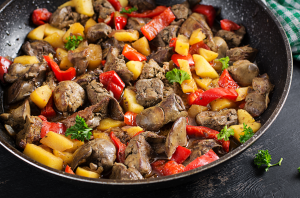Rest assured that your cousin knows quite well what he is doing and has a good grasp on the laws of kosher; he didn’t decide arbitrarily that not enough fell in to render the food non-kosher, but his ruling was grounded in Torah sources. In fact, not only would his ruling apply to milk which inadvertently fell into meat. It extends to a small bit of non-kosher meat, even pork, which fell in as well!
Let’s start from the beginning…fasten your seat belt!
The Talmud rules that if you have a few chunks of kosher meat and a chunk of non-kosher meat gets mixed up with them, you may eat them all. This is based upon the Torah principle that “majority rules.” The concept of majority rules tells us that the non-kosher piece becomes “batel,” or nullified, to the kosher pieces and it then loses its non-kosher status.
The above applies to dry pieces of meat which were cooked previously and are not being cooked together, and eating them as they are. If, however, they are cooked together, that brings up another issue: The taste, or “taam,” of the non-kosher is extended, through the cooking, into the kosher meat; rendering it non-kosher as well. This is the concept of “taam k’ikar,” meaning that the taste of a food has the status of the food itself which provided that taste. When the taste of non-kosher food enters the kosher food, it becomes non-kosher.
In order for “taam k’ikar” to take effect, the taste must be strong enough to be distinguishable by someone sensitive to taste. The Talmud rules that, for most foods, in order for the taste to be considered distinguishable, it must be more than one sixtieth (1/60) of the kosher food it fell into. For example, if one ounce of non-kosher food fell into 60 ounces of kosher, its taste is not strong enough to permeate the kosher food in a distinguishable way. Hence, there is no “taam k’ikar,” and it becomes “batel,” nullified into the kosher food and the entire mixture is rendered kosher.
This applies to milk falling into meat as well. The only way that a mixture of meat and milk is considered non-kosher is if enough milk falls into the meat to give its “taam,” or taste, to the meat. If there was sixty times the meat in the pot against the drops of ice cream that fell in, then the taste of the ice cream, the milk, is considered indistinguishable in the meat and the entire mixture is kosher. So your cousin wasn’t mistaken, he was treading on solid ground!
The important thing to remember is that the laws of the Torah are not static, rigid, dry rules. Rather, as they are God-given, they are rich and full of life, and often He who forbade, He also permitted under certain circumstances. When one fathoms the depth of these law, he will find that they are applicable to life’s myriad situations in varied, often, surprising ways!
Sincerely,
Rabbi Yerachmiel Fried


